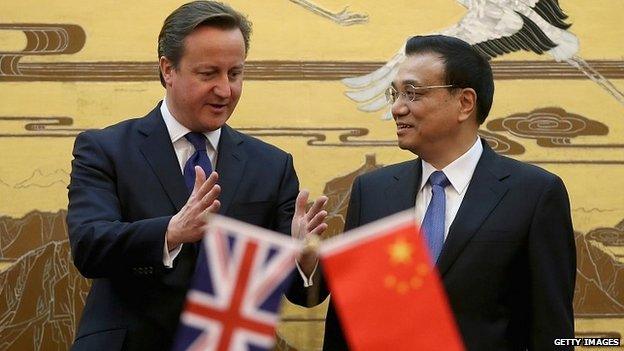China - What a difference a trip makes
- Published

David Cameron with Chinese Premier Li Keqiang in Beijing
The prime minister has insisted that he will shine a spotlight on the human rights abuses of his hosts. That, of course, was the last trip not this one. After all Sri Lanka, unlike China, is not crucial to what David Cameron calls the global race.
Beijing is a city of promise and of menace. Every visitor here has to choose which to focus on. The PM made his choice today, emphasising Britain's desire to help China fulfil its dream.
His dream is that Chinese money will pay not just for nuclear power but also for high speed rail. He wants British firms to access China's markets - today Jaguar Land Rover announced orders for another 100,000 cars here.
Premier Li thanked David Cameron for his "respect for China's core national interests and major concerns" - code for not rocking the boat on Tibet and human rights. He added that the relationship between the two countries was accelerating as fast as any high speed rail link.
At the end of their news conference - or what was officially dubbed "press statements" - there was no opportunity to ask questions. The Chinese ruled them out. The British complied. Yet in 2005 I was able to ask Premier Wen a question about democracy. It's proof that all the talk of "reform" means something very different to Chinese as against British ears.
Afterwards I tried to go to Tiananmen Square to film as I had on my previous visits to the Chinese capital. After first being allowed in we were stopped by the police. We didn't have the necessary permit. They take days to apply for. Another reminder that this is a country which fears change just as much as it embodies it.
Many at home will, no doubt, share the prime minister's desire for Chinese money to fund Britain's recovery. Others, though, are sure to ask whether it comes at too great a price.
UPDATE 16:00 GMT
I asked David Cameron why his approach to human rights appeared different on trips to Sri Lanka and China. He replied: "I think I'm totally consistent. I come to China and I don't believe there's a choice between raising growth and investment issues and raising human rights issues. I raise them both. That's what a policy of engagement is all about.
"There are some huge opportunities here in China for British jobs, British growth and British investment. I want to make the most of them and that's right for our country to compete and succeed in the global race.
" But I also raised concerns about human rights and we have agreed on this visit to restart the China/Britain human rights dialogue. We will start again next year, so that is an important achievement."